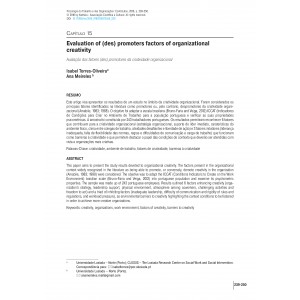Amabile, T. 1996. Creativity in context. Boulder, CO: Westview Press.
Amabile, T. 1997. “Motivating creativity in organizations: On doing what you love and loving what you do”, California Management Review, vol. 40, no.1, pp. 39-58.
Amabile, T. 1998. “How to kill creativity”, Harvard Business Review, September-October, pp.77-88.
Awoniyi, E., Grieco, O. and Morgan, G. 2002. “Person-enviroment fit and transfer of training”, International Journal of Training and Development, vol. 6, no.1, pp.25-35.
Baer, M. 2012. “Putting creativity to work: the implementation of creative ideas in organizations”, Academy of Management Journal, vol. 55, nº5, pp.1102-1119.
Bourguignon, A. 2006, Spring. ”Creativity in organizations”, International Studies of Management and Organization, vol. 36, nº1, pp.3-7.
Bratnicka, K. and Bratniki, M. 2013. “Linking two dimensions of organizational creativity to firm performance: the mediating role of corporate entrepreneuship and the moderating role of environment”, Advances in Business-Related Scientific Research Journal, vol. 4, nº 2, pp. 153-163.
Bruno-Faria, M. F., Veiga, H. M. S. S., and Macedo, L. F. 2008. “Criatividade nas organizações: análise da produção científica nacional em periódicos e livros de Administração e Psicologia”, Revista da Psicologia das Organizações e do Trabalho, vol.8, nº1, pp.142-163.
Choi, J., Troy, A. and Anick, V. 2009. “Contextual inhibitors of employee creativity in organizations: the insulating role of creative ability”, Group & Organization Management, vol. 34, nº 3, pp.330-357.
Dejours, C. 2000. Travail, usure mental. Bayard Éditions, Paris, Fr.
Frendt, J. 2006. “Are you promoting change – or hindering it?” Harvard Business Publishing Newsletters.
George, J. M., 2007. “Creativity in Organizations”, The Academy of Management Annals, vol.1, no.1, pp. 439-477.
Gong, Y., Kim, T.-Y., Lee, D.-R. and Zhu, J. 2013. “A multilevel model of team goal orientation, information exchange and creativity”, Academy of Management Journal, vol.56, nº 3, pp. 827-851.
Hennessey, B. A. and Amabile, T., 2010. “Creativity”, Annual Review of Psychology, Vol. 61, pp. 569-598, 2010
Hirst, G., Knippenberg, D.V. and Zhou, J. 2009. “A cross-level perspective on employee creativity: goal orientation, team learning behavior, and individual creativity”, Academy of Management Journal, vol.52, nº 2, pp. 280-293.
Kallio, T. and Kallio, K.-M. (2011). “Organizational creativity – from hype to organizational structures facilitating creativity”, Liketaloudellinen Aikakauskirja, vol.1, pp. 6-7.
Liao, H., Liu, D. and Loi, R. 2010. “Looking at both sides of the social Exchange coin: a social cognitive perspective on the joint effects of relationship quality and differentiation on creativity”, Academy of Management Journal, vol.53, nº 5, pp. 1090-1109.
Long, J. 2013. “Workplace pressure moderates perception of threat or opportunity and employee creativity after downsizing”, Social Behavior and Personality, vol.4, nº 6, pp. 957-970.
Oldham, G.R. and Cummings, A. 1996. “Employee creativity: personal and contextual factors at work”, Academy Management Journal, vol. 39, nº3, pp. 607-634.
Reiter-Palmon, R. 2011. “Introduction to special issue: the Psychology of creativity and innovation in the workplace”, Psychology of Aesthetics, Creativity and Arts, vol. 5, nº 1, pp.1-2.
Robbins, S. P, and Judge, T. 2008. Organizational Behavior. Pearson Prentice Hall, New York, USA.
Sawyer, K. 2007. Group genius: the creative power of collaboration. Basic Books, New York, USA.
Shalley, C. and Gilson, L. 2004. “What leaders need to know: a review of social and contextual factors that can foster or hinder creativity”, The Leadership Quarterly, vol. 15, pp. 33-53.
Scott, R. K. 1995. “Creative employees. A challenge to managers”, Journal of Creative Behaviour, vol. 29, nº29, pp.64-71.
Torres-Oliveira, I. 2011. “Compreender a criatividade nas organizações”. Contributos da Psicologia do Trabalho. In Wechsler, S. M. & Nakano, T. C. (Orgs.), Criatividade no ensino superior: uma perspectiva internacional (pp.80-123) São Paulo: Vetor Editora.






![Contributos do ensino e da investigação, Nº [17-18] - Junho/Dezembro 2012 Contributos dos ensino e da investigação, Nº [17-18] - Junho/Dezembro 2012](https://www.publicacoesfacfil.pt/img/p/530-576-medium.jpg)


